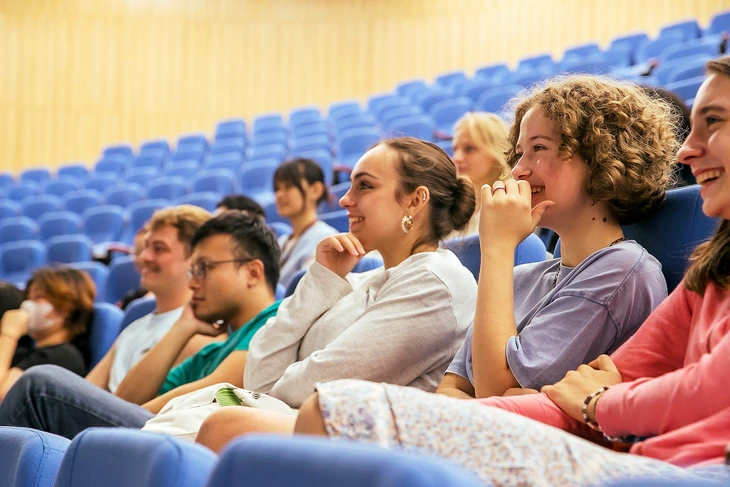
International students at Vietnam-Germany University - Photo: NT
Meanwhile, universities are also making efforts to attract international students.
Many reasons to choose Vietnam
Saran Palanisamy (Indian) is a medical student of the class of 2021 at Hong Bang International University. The entire medical training program that Saran Palanisamy is studying is taught in English.
Saran Palanisamy is one of the first 50 Indian students to study medicine at Hong Bang International University. Saran Palanisamy shared that the medical entrance exam in India is very fierce while the number of medical schools cannot meet all the needs of candidates.
"That is the main reason I chose Vietnam to study medicine at university. The way medical training in Vietnam and India is different in many ways, but the quality of training here also has its own strengths. The cost of studying and living in Vietnam is relatively moderate, while studying in India is very expensive," Saran Palanisamy added.
Meanwhile, Park Jun Seo (Korea) chose Vietnam to study at university because he felt that the opportunities to study and work in Vietnam were easier than in Korea. Park Jun Seo graduated from the University of Economics Ho Chi Minh City with a degree in international business and is currently continuing his university studies in corporate accounting.
Park Jun Seo said that the environment and facilities of Ho Chi Minh City University of Economics are quite modern, and the teachers are also excellent. He personally feels very satisfied.
Full-time international students are on the rise.
Associate Professor Dr. Bui Quang Hung - Vice Director of the University of Economics, Ho Chi Minh City - said that the university's regular system has more than 40 foreign students. Most of them are from Myanmar, China, Korea, France, New Zealand, Laos, Ukraine, Cambodia...
With exchange programs, every year more than 100 foreign students come to the school and the same number of students go to partner schools to study.
According to schools, the number of international students studying full-time tends to increase but the number is still limited. Most international students currently in schools are short-term exchange students lasting 1-2 semesters.
Dr. Ha Thuc Vien - Vice President of Vietnam-Germany University - said that about 2% of the total number of students are from different countries, especially from countries in Southeast Asia and Europe. In the 2024-2025 school year, the school will receive more than 100 students from countries in the region and Europe.
Meanwhile, Associate Professor Dr. Dinh Duc Anh Vu - Vice Principal of the International University (Ho Chi Minh City National University) - said that the number of full-time international students (self-funded study abroad) at the school is only a few. Most of the international students come from the school's network of partner universities, sending students to exchange for 1-2 semesters. The school's students also go to partner universities to study for 1-2 semesters.
"In reality, attracting international students is not easy because the overall environment is not favorable. For example, in class, students learn in English, but when they go out to go to the market, shop, and live, it will be difficult. Moreover, in addition to students who want to have cultural experiences, most students tend to choose to study abroad in countries that are more developed than their own country," Mr. Vu explained further.
International Center for Education and Training
In 2023, the Government assigned the Ministry of Education and Training to coordinate with the Ho Chi Minh City People's Committee to develop a project to build Ho Chi Minh City into an international center of education and training, attracting students from the region and the world .
In 2023, the Ho Chi Minh City People's Committee decided to establish a working group and a support group to implement this project. The working group performs the function of assisting the Ho Chi Minh City People's Committee in coordinating with the Ministry of Education and Training, Ho Chi Minh City National University and universities in the city to implement the project.
Research and develop mechanisms and policies to guide the development strategy of Ho Chi Minh City to become a center for training high-quality human resources in the region and the world, strengthen international cooperation in higher education, post-graduate education, build international standard training programs... to attract regional and international students to study in the city.
As a member of the working group's deputy head, Prof. Dr. Huynh Van Son - Principal of Ho Chi Minh City University of Education - assessed that if this project is well implemented, it will be very promising and suitable for the current context of international integration. However, he also has some comments for the project that is being consulted.
"The project should add the content of international integration to ensure action orientation. Consider adding appendices to ensure data and evidence to ensure the persuasiveness of the project. Consider adding some ideas related to the mechanism to encourage foreign learners with oriented solutions to ensure the attractiveness of this project. Adjust the project's update roadmap to ensure feasibility.
Besides, it is necessary to ensure updating of legal documents on planning, training guidelines, quality assurance... of ministries and branches when developing detailed projects" - Professor Son stated.
Mr. Bui Quang Hung said that to become an international center of education and training, it is necessary to create an international educational environment, international training programs and international standard teaching staff.
Only with an internationally standardized program can we invite international lecturers to teach. Facilities and amenities for students, and a variety of international educational activities. Only then can we attract international students to study.
"The school invests in modern facilities. The training program is accredited according to regional and international standards based on comparison and is recognized by international universities, but inviting foreign lecturers is very difficult.
How to have a mechanism to transfer international labor to work, especially at key universities. Currently, it is very difficult to get work permits for lecturers. In the past few years, the school has only recruited a few lecturers" - Mr. Hung proposed.
Sharing this view, Mr. Dinh Duc Anh Vu said that the difficulty does not lie in the remuneration or salary for foreign lecturers but in the regulations on work permits for foreigners.
"Whether they apply for a work permit themselves or have the school do it on their behalf, the paperwork is still very difficult and complicated," said Mr. Vu.
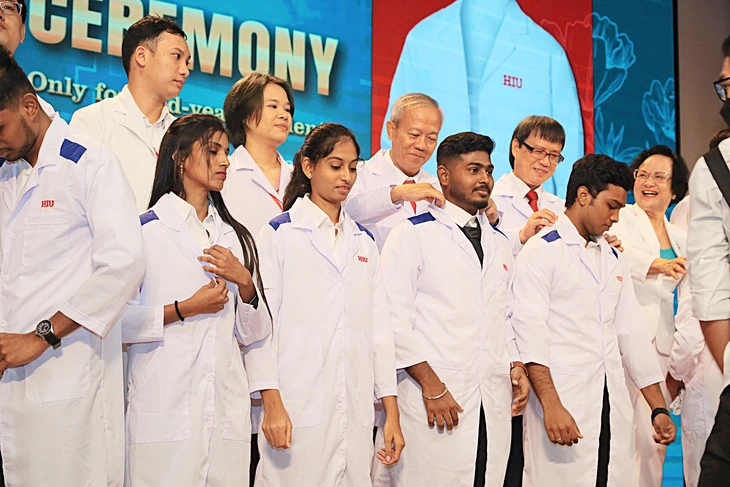
Indian medical students at Hong Bang International University during the white coat ceremony - Photo: NT
Training human resources at international level
Currently, many universities are implementing student training according to the overall project of training international-level human resources of the People's Committee of Ho Chi Minh City. The University of Social Sciences and Humanities (Ho Chi Minh City National University) participates in component project No. 8, training international-level human resources in urban management.
Prof. Dr. Ngo Thi Phuong Lan - Principal of the University of Social Sciences and Humanities - assessed that this activity has had a positive impact on many stakeholders. However, the city's recruitment target for human resources in this industry does not have an exact number, so the school has difficulty in determining training targets to suit the needs.
Similarly, Ho Chi Minh City University of Economics is implementing component project number 5, training international-level human resources in the finance and banking sector.
Mr. Bui Quang Hung said the school built its own program, compared the program with prestigious partner universities and has enrolled one course.
"If the city participates in ordering, providing budget and employing students after graduation, it will be better," said Mr. Hung.
Ho Chi Minh City has many advantages.
Education expert Tran Duc Canh - Chairman of the Council of the Saigon Institute for Higher Education Development (SIHED) - said that Ho Chi Minh City has many advantages to develop into a center of innovation, education, business investment... compared to other regions. The city's education is also better developed, open education, and there are many exchanges with overseas Vietnamese and intellectuals.
With such conditions, the development into an international center of education and training will be favorable and have good leverage. However, the city needs a long-term strategy. The city also needs to evaluate the quantity and quality of current human resources at all levels, and build a human resource development plan linked to the needs of socio-economic development in the next 20 years.
Source: https://tuoitre.vn/tp-hcm-no-luc-thu-hut-sinh-vien-quoc-te-20250424085005516.htm








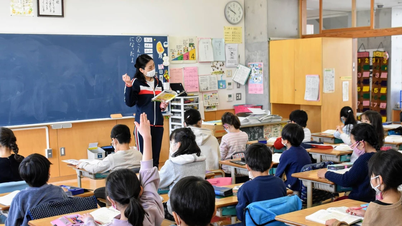





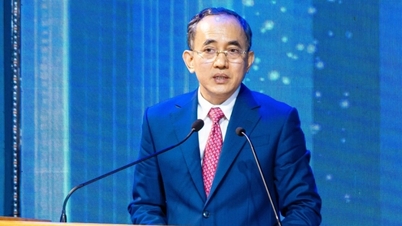

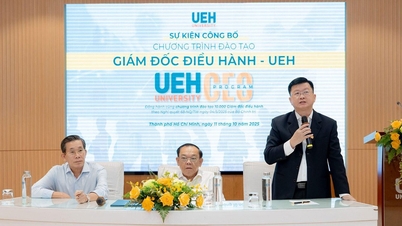

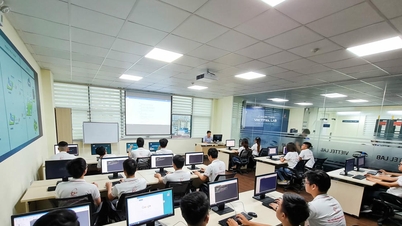









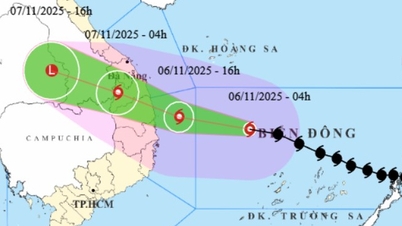



![[Photo] Opening of the 14th Conference of the 13th Party Central Committee](https://vphoto.vietnam.vn/thumb/1200x675/vietnam/resource/IMAGE/2025/11/05/1762310995216_a5-bnd-5742-5255-jpg.webp)
![[Photo] Panorama of the Patriotic Emulation Congress of Nhan Dan Newspaper for the period 2025-2030](https://vphoto.vietnam.vn/thumb/1200x675/vietnam/resource/IMAGE/2025/11/04/1762252775462_ndo_br_dhthiduayeuncbaond-6125-jpg.webp)




































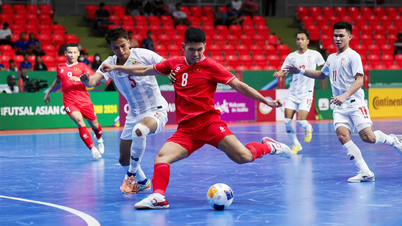


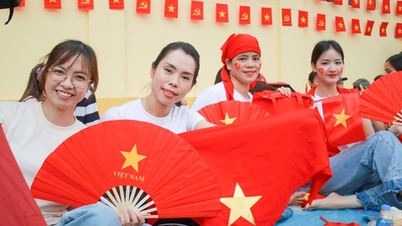







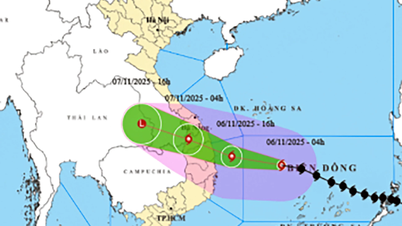





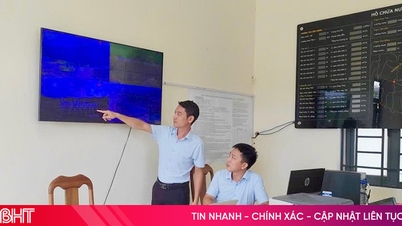

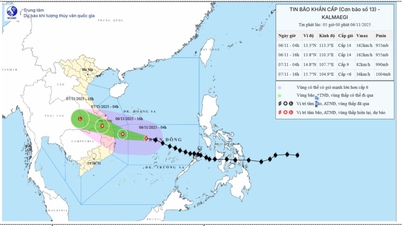

















Comment (0)